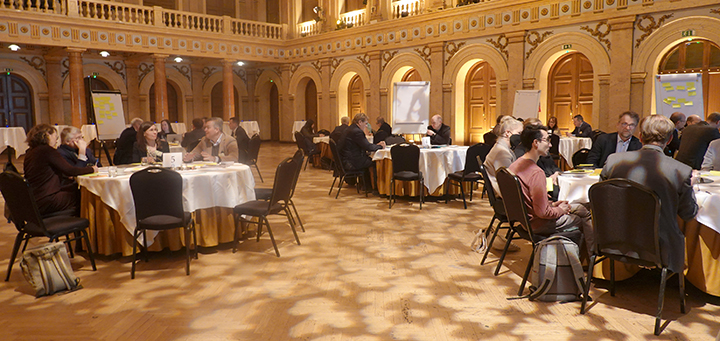2 December 2022
Cities shared their inspiring visions for the future and drove learning at WALCC workshop

The Board of the World Alliance for Low Carbon Cities was joined by a group of 30 individuals representing cities, companies both large and small, development agencies, and government agencies at the Old Student House in Helsinki on November 22nd for the “Accelerating Co-learning” workshop. The workshop, taking place half a year on from the Alliance’s Forum in Lahti, brought a problem-solving approach to the initiatives discussed and plans presented at the Forum. The gathered participants were invited to tackle a series of questions or challenges around a series of four cases rooted in Finnish cities, presented in 15-minute panel discussions with moderator Johan Wallin, Honorary Chairman of the Alliance and Managing Partner at Synocus.
The opening addresses from Jyrki Alkio, Chief Specialist at the Ministry of Economic Affairs and Employment of Finland, and Mikko Kosonen, Chair of the Board at Aalto University, set the stage for the days work. Mr. Alkio began by summarizing the national efforts devoted to sustainable development and ecosystem building led by the Ministry while Mr. Kosonen introduced the concept of the Viability Advantage which served as a framework for the day’s discussions. Mr. Kosonen’s key message was the need for collaboration to achieve sustainable growth and address the wicked problems facing the world.
These addresses were followed by the first of the day’s four cases with Elina Ojala, Environmental Director at the City of Lahti, and Mikko Veikkolainen, CTO at Kempower, taking the stage to share their insights on Lahti’s climate leadership and Kempower’s rise as a world-class provider of EV charging stations. The participants then set to work in groups of 5-8 persons, addressing the questions posed at the conclusion of the panel discussion. The key insights raised by the groups touched on the need for trust-based ecosystems in building a common vision for concrete projects and leveraging them, securing competencies to enable joint value creation and implementation, as well as the motivating influence of ambitious targets.
The next case was presented by Mr. Tomas Häyry, the Mayor of Vaasa, and Petri Helo, Chair of the Board at Wapice, who discussed Vaasa’s active positioning of the city as a hub for Nordic energy solutions as well as Wapice’s vision of IoT technology’s role in advancing sustainability. Additionally, Mayor Häyry announced that the 2023 WALCC Forum would be held in Vaasa next September. The groups discussed the necessary capabilities for building ecosystems, noting the need for mapping of the actors and system, garnering political will and commitment, defining a clear mission and focus, adopting a systemic approach, basing decisions on data, strong leadership and culture, and clear orchestration. Discussion also addressed the need for concrete projects that can identify potentially world-class core competencies, create diverse networks to cross-fertilize ideas, conduct ambitious pilots, and generate superior innovative business models.

After lunch, the Alliance’s Board members, Chairman Pasi Mikkonen (Fortum), Vice-chairman Peter Lindgren (ABB), Toni Tuomola (Skanska), Elina Ojala (City of Lahti), and Pekka Sundman (City of Turku) took part in a joint panel discussion. The Board members discussed the Alliance’s role in advancing decarbonization through projects that bring companies and solution providers into dialogue with the cities in need of solutions. The Board also introduced the Alliance’s action plan for 2023, see below.
The first of the afternoon’s two case sessions kicked off with Markus Laine, of Tampere University, joining Toni Tuomola for a discussion on the Nordic Superblocks as Decarbonization Catalysts (NSDC) initiative. The NSDC initiative seeks Business Finland funding to support the City of Tampere in developing a communal, smart city district in the Hiedanranta area currently under development. Their discussion inspired the participants to brainstorm conclusions on the impact of an agile company structure in enabling flexible development, ensuring the right stakeholders are onboard at the right time, and understanding the positive impacts widely. The participants also raised the necessity of understanding not only the present moment, but the past situation and the future goals to shape solutions ideally suited to the challenge at hand.
The final case session of the day was introduced by Elina Wanne, Development Manager at the City of Espoo on sustainable energy, and Mikko Blomqvist, Development Manager at Fortum. They discussed Fortum’s support of Espoo’s transition to decarbonized district heating, an effort addressed under the Clean Heat Espoo program which has already gained international attention from South Dublin, Ireland, where Fortum has developed a local solution. The participants wrapped up the final discussion with thoughts on prioritizing national solutions with big global potential based on scientific evidence.
The day concluded with sessions from Mikko Kosonen, sharing insights on the capabilities necessary to pursue Viability Advantage, and Markku Markkula, Chair of the Helsinki-Uusimaa Regional Council and a member of the EU Committee of the Regions, who joined Mr. Wallin to share their insights on the day’s discussions.
The “Accelerating Co-learning” workshop offered a chance for the Alliance and its extended network to sit down together and work through the challenges facing cities and companies as they seek to collaborate on decarbonization. The workshop generated a host of valuable insights which will shape the coming year’s efforts as the Alliance works to initiate numerous projects addressing its focus areas.
Join us in Vaasa next September and stay tuned to our website for updates on the activities undertaken in the meanwhile!